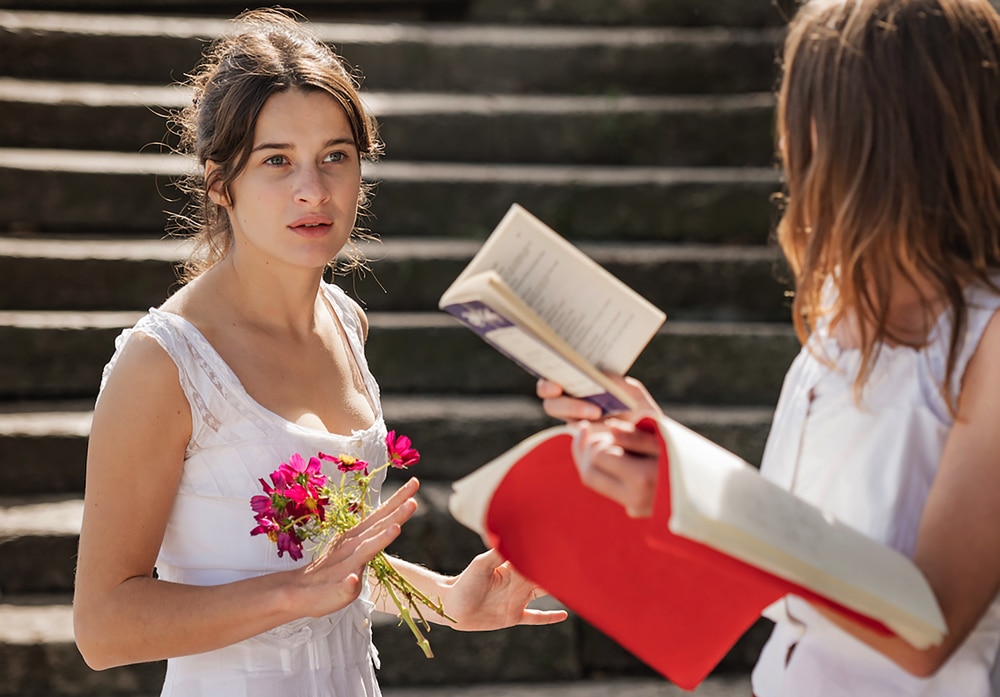




Dir/Wri: Sandrine Kiberlain | Cast: Rebecca Marder, Ben Attal, India Hair, André Marcon, Anthony Bajon and Florence Viala.
Garlanded actress Sadrine Kiberlain makes her debut behind the camera with this wartime drama about a young Jewish woman living in Paris in the early days of the German occupation in 1942.
Comédie-Française actress Rebecca Marder who recently starred in Spring Blossom, the debut feature of Kiberlain’s daughter Suzanne Lindon. She plays 19-year-old Irene whose passion for acting is only dimmed by the shadow of war.
Far too often cinema pictures the plight of Jews under the Nazis, the latter dominating, the production design getting the lion share of the budget, the victims very much stereotypes. Kiberlain offers a refreshingly different approach and appears to have solved the conundrum: her middle class Jewish family in the Parisian summer of 1942 lives under occupation, but the emblem of evil only appears for a few seconds.
Irene (Marder) is nineteen years old and lives with her older brother Igor (Bajon) in a flat with her grandmother Marceline (Widhoff) and Andre (Marcon), a father figure, Irene’s biological father is an unnamed “public accountant”. We learn this when Andre begs Irene’s drama tutor to classify her as “half Jewish” for the forthcoming audition for the Conservatoire of Dramatic Arts. By then we are more than half way through the film, which starts with rehearsals for Marivaux’s ‘La Meprise’ (The Misconception), in which Irene has a part as well as her love-interest Jo (Attal), who is also Jewish.
Irene is playful, the Marivaux rehearsals are much more dominant in her life than Marceline’s struggle: Andre had to go to the police to have a red “J” stamped in all of their identity-cards. The agnostic Marceline finally relents and gives Andre the documents, after hiding them. Andre is relieved: “Nothing will happen to us, we are French. I heard of Madame K. being arrested, but she was Polish”. Irene meanwhile feels dizzy and has fainting spells. Doctor V. prescribes vitamins and an eye test, conducted by Jacques (Metzger). Irene falls for him, since Jo has disappeared. Best friend Viviane (Hair) dresses up as a boy to take Jo’s place in the play.
When the day arrives for the results to be handed out much has changed: The families’ radio and binoculars have been confiscated, Andre finds a note asking him “to please enter the building by the backdoor”. At the bakery the family is not served: “sold out” says the shop assistant, with the racks bulging with baguettes. Igor’s long time girl friend Heloise suddenly cancels her invitation to spend the Shabbat with the family, and the only non-Jewish guest, Josiane (Viala), is no great help either: “I like Jews personally, and find other cultures interesting, like travelling”. Students share their dreams about what they will do if selected. Vivienne and Irene (now wearing the Yellow Star) have the highest hopes, when Vivienne spots something and the screen goes dark.
Kiberlain’s minimalist approach has been shot in contemporary Paris, focusing on the Germans’. psychological tactics of isolating Jews and leaving them in fear what will happen next. In spite of all this, A Radiant Girl is often playful like its titular character. We are reminded of Rivette’s La Bande des Quartre, with four treasure hunting young women also being in a Marivaux play: ‘La double Inconstance’.
Rebecca Marder is pitch-perfect: just hitting the right notes between romantic innocence and provocative wilfulness. DoP Guillaume Schiffman’s images capture the sunset of the family, conjuring up a bourgeois Paris, where the victims are shunned by their own class. A passionate and mature debut. AS
CANNES FILM FESTIVAL